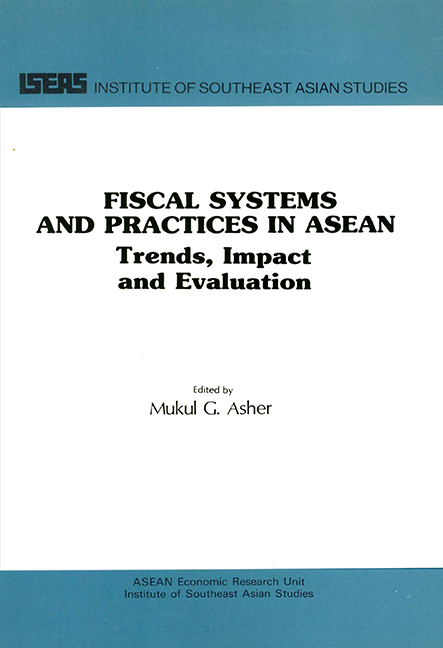Book contents
- Frontmatter
- Contents
- List of Tables
- List of Figures
- Acknowledgements
- 1 A Comparative Overview of ASEAN Fiscal Systems an Practices
- 2 Fiscal System and Practices in Indonesia
- 3 Fiscal System and Practices in Malaysia
- 4 Fiscal System and Practices in the Philippines
- 5 Fiscal System and Practices in Singapore
- 6 Fiscal System and Practices in Thailand
- THE EDITOR
6 - Fiscal System and Practices in Thailand
Published online by Cambridge University Press: 21 October 2015
- Frontmatter
- Contents
- List of Tables
- List of Figures
- Acknowledgements
- 1 A Comparative Overview of ASEAN Fiscal Systems an Practices
- 2 Fiscal System and Practices in Indonesia
- 3 Fiscal System and Practices in Malaysia
- 4 Fiscal System and Practices in the Philippines
- 5 Fiscal System and Practices in Singapore
- 6 Fiscal System and Practices in Thailand
- THE EDITOR
Summary
Introduction
In Thailand the public sector consists of three major institutions: the central government, state enterprises and local governments. The size of the Thai public sector has expanded rapidly both in absolute terms and in relation to the total size of the economy.
The central government finance is made up of budgetary and non-budgetary transactions. Budgetary transactions refer to the fiscal transactions as stated in the annual budget. They are financed by budgetary receipts which may take the following forms: tax revenue, sales and charges, contributions from state enterprises, domestic borrowing and use of treasury cash balance.
Non-budgetary transactions are those outside the annual budget, which may take the forms of foreign grants and loans and extra-budgetary funds. The extra-budgetary funds consist of deposits of public agencies with the treasury and revolving funds set up for specific purposes. These funds are not subject to budgetary control and depositing agencies can disburse their funds without having to go through the normal budgetary procedures. An example of revolving funds is the Oil Fund, which was set up to stabilize the retail prices of petroleum products through charges and subsidies on their retail sale.
Central government deficit on a cash basis consists of a budgetary cash deficit plus non-budgetary cash deficit made up of an extra-budgetary deficit and external loans and grants. Thus, while budgetary deficit may be financed only by domestic borrowing, central government expenditure financed by external loans forms a part of non-budgetary transactions.
State enterprises are the second major public sector institution in Thailand. Their budget consists of a current and a capital budget. While the current budget is mostly financed by their operating revenue, most capital expenditure is financed by domestic and external borrowings. These borrowings require the approval of the National Debt Committee at the Ministry of Finance, which is responsible for ensuring consistency with macro-economic targets. Certain state enterprises do receive subsidies from the central government budget. These enterprises are engaged mostly in promotional activities and do not earn revenue. Tourism Authority and Sports Authority are two examples of such enterprises receiving subsidies.
Information
- Type
- Chapter
- Information
- Fiscal System and Practices in ASEANTrends, Impact and Evaluation, pp. 184 - 219Publisher: ISEAS–Yusof Ishak InstitutePrint publication year: 1989
